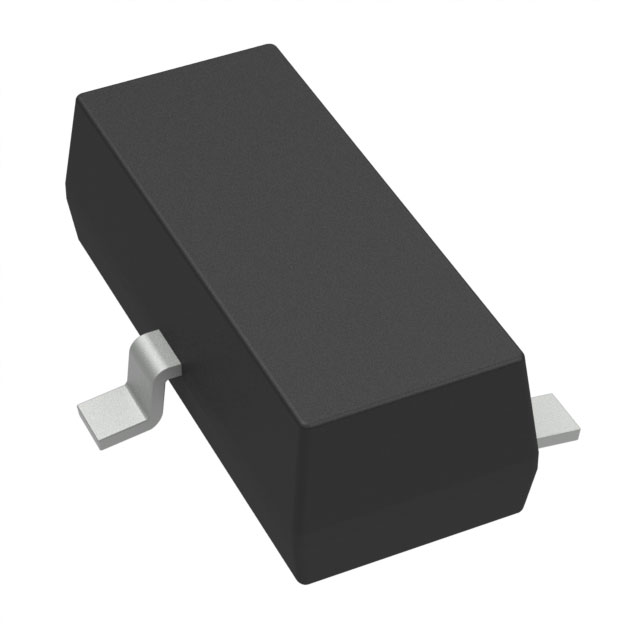Xem thông số kỹ thuật để biết chi tiết sản phẩm.

LM4040A10IDBZT
Product Overview
Category: Integrated Circuit (IC)
Use: Voltage Reference
Characteristics: - Precision voltage reference - Low dropout voltage - High accuracy and stability - Wide operating temperature range - Small package size
Package: SOT-23-3
Essence: The LM4040A10IDBZT is a precision voltage reference IC that provides a stable and accurate output voltage.
Packaging/Quantity: The LM4040A10IDBZT is available in tape and reel packaging, with 3000 units per reel.
Specifications
- Output Voltage: 1.024V
- Initial Accuracy: ±0.1%
- Temperature Coefficient: 100ppm/°C
- Dropout Voltage: 60mV
- Operating Temperature Range: -40°C to +85°C
- Supply Voltage Range: 2.7V to 10V
- Quiescent Current: 60µA
Pin Configuration
The LM4040A10IDBZT has three pins arranged in the following configuration:
```
| | --| VOUT |-- --| |-- --| GND |-- |_______| ```
Pin Descriptions: - VOUT: Output voltage pin - GND: Ground pin
Functional Features
- High precision: The LM4040A10IDBZT offers a highly accurate output voltage of 1.024V with an initial accuracy of ±0.1%.
- Low dropout voltage: With a dropout voltage of only 60mV, this voltage reference IC can operate efficiently even with low input voltages.
- Temperature stability: The LM4040A10IDBZT exhibits excellent temperature stability with a temperature coefficient of 100ppm/°C, ensuring consistent performance across a wide temperature range.
- Low quiescent current: The IC has a low quiescent current of 60µA, making it suitable for battery-powered applications.
Advantages and Disadvantages
Advantages: - High accuracy and stability - Small package size - Wide operating temperature range - Low dropout voltage
Disadvantages: - Limited output voltage options (only 1.024V)
Working Principles
The LM4040A10IDBZT is based on bandgap reference technology. It utilizes the inherent voltage drop across a forward-biased diode to generate a stable and precise output voltage. The internal circuitry compensates for temperature variations, ensuring accurate voltage output over a wide temperature range.
Detailed Application Field Plans
The LM4040A10IDBZT can be used in various applications that require a stable and accurate voltage reference. Some potential application fields include: - Precision analog-to-digital converters (ADCs) - Voltage regulators - Battery management systems - Test and measurement equipment - Industrial control systems
Detailed and Complete Alternative Models
Some alternative models that offer similar functionality to the LM4040A10IDBZT are: - LT1236ACS8-10: Precision Shunt Voltage Reference, 1.024V, ±0.05% Accuracy - MAX6126AASA25: Ultra-High-Precision Voltage Reference, 2.5V, ±0.02% Accuracy - REF5025AIDGKT: Precision Voltage Reference, 2.5V, ±0.05% Accuracy
These alternative models provide different output voltages and accuracies, allowing users to choose the most suitable option for their specific requirements.
In conclusion, the LM4040A10IDBZT is a precision voltage reference IC that offers high accuracy, stability, and low dropout voltage. It is widely used in various applications where a stable and accurate voltage reference is essential.
Liệt kê 10 câu hỏi và câu trả lời thường gặp liên quan đến ứng dụng LM4040A10IDBZT trong giải pháp kỹ thuật
Sure! Here are 10 common questions and answers related to the application of LM4040A10IDBZT in technical solutions:
Q: What is LM4040A10IDBZT? A: LM4040A10IDBZT is a precision voltage reference IC that provides a stable and accurate voltage output of 10V.
Q: What is the typical application of LM4040A10IDBZT? A: LM4040A10IDBZT is commonly used as a voltage reference in various electronic circuits, such as analog-to-digital converters (ADCs), digital-to-analog converters (DACs), and voltage regulators.
Q: What is the voltage accuracy of LM4040A10IDBZT? A: The voltage accuracy of LM4040A10IDBZT is typically within ±0.1% of the nominal output voltage.
Q: What is the temperature coefficient of LM4040A10IDBZT? A: The temperature coefficient of LM4040A10IDBZT is typically 50 ppm/°C, which means the output voltage changes by 50 parts per million for every degree Celsius change in temperature.
Q: Can LM4040A10IDBZT operate from a single power supply? A: Yes, LM4040A10IDBZT can operate from a single power supply ranging from 2.7V to 12V.
Q: Is LM4040A10IDBZT suitable for low-power applications? A: Yes, LM4040A10IDBZT has a low quiescent current consumption of typically 60 µA, making it suitable for low-power applications.
Q: Does LM4040A10IDBZT require an external capacitor for stability? A: No, LM4040A10IDBZT is a precision voltage reference that does not require an external capacitor for stability.
Q: Can LM4040A10IDBZT withstand high temperatures? A: Yes, LM4040A10IDBZT has a maximum operating temperature range of -40°C to +125°C, making it suitable for various environments.
Q: What is the output current capability of LM4040A10IDBZT? A: LM4040A10IDBZT can provide a maximum output current of 15 mA.
Q: Is LM4040A10IDBZT available in different package options? A: Yes, LM4040A10IDBZT is available in various package options, including SOT-23 and TO-92, providing flexibility for different PCB layouts and applications.
Please note that these answers are general and may vary depending on specific datasheet specifications and application requirements.

